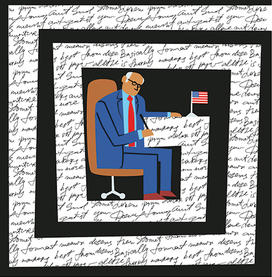Frances E. Lee Is Dissecting American Politics
Frances E. Lee always wanted to be a teacher. As a high school student in southern Mississippi, she deeply admired her English and history teachers — she just wasn’t sure what subject she’d want to teach.
She first became interested in politics in college during a year abroad in Wales. There she was exposed to “a much wider range of political views than I had ever previously encountered,” she says. Once back at the University of Southern Mississippi, she decided to write her thesis on how the English literature canon is constructed. “It’s a political question about how we teach English: What is great literature, what choices we make, who’s being excluded and included.”
Lee went on to earn her Ph.D. in political science from Vanderbilt University. Her research centers on American politics, with a special focus on congressional politics, national policymaking, party politics, and representation. “I am not a political activist,” she notes. “My interests are in analysis more than in social change.”
Lee, now a professor at Princeton in politics and the School of Public and International Affairs, has won numerous awards for her publications, including from the American Political Science Association. From 2002 to 2003 she worked on Capitol Hill as an American Political Science Association Congressional Fellow.
Quick Facts
Title
Professor of Politics and Public Affairs
Time at Princeton
5 years
Recent Class
Congressional Politics
Lee’s Research: A Sampling

False Rumors of Gridlock
More so than ever in the post-WWII era, congressional Democrats and Republicans outwardly clash and vote along party lines. Lee wanted to find out what effect this dramatic increase in partisanship has had on policymaking in her 2020 book The Limits of Party: Congress and Lawmaking in a Polarized Era. “The surprise is: There’s not much difference. Legislating is bipartisan to the same degree as it has previously been,” she says. What is different is that there are fewer individual laws passing, but these laws are much longer in terms of text. “In fact, Congress has set new records for the amount of legislation enacted” in the past several years, Lee says. “There’s a lot of rhetoric about nothing happening. But it’s just not correct.”

Fighting Over Crumbs
One common explanation for the increasingly heated, confrontational rhetoric in politics today is ideological polarization. But Lee argues there’s also “a partisan rivalry for power that’s driving our politics.” Prior to 1980, she says, Democrats were seen by both parties as the “natural majority” due to the party’s longstanding hold on Congress and larger share of citizen affiliation. This resulted in a more cooperative relationship because the question of who’s in power was already settled. In her 2016 book Insecure Majorities: Congress and the Perpetual Campaign, Lee shows how this dynamic has changed, with both parties now vying equally for power and spending more money, staging more roll-call votes, and crafting more partisan messaging to win. “Party control is hanging in the balance. There’s a lot more at stake. And it doesn’t seem to be coming to an end anytime soon.”

Populism vs. American Democracy
With the rise of populism at home and abroad, Lee became interested in how the movement might affect American democracy. “Questions about the rule of law, about corruption of election procedures, attacks on checks and balances, [and] executive aggrandizement” are all classic populist themes, she notes. In two articles on the topic from 2019 and 2023, she argues that the U.S. political system is actually “quite resilient to the threats that populism poses” due to robust checks and balances, the two-term presidential limit, and decentralization of election control. “There’s no one place where power is that you can win control of it all.”












No responses yet